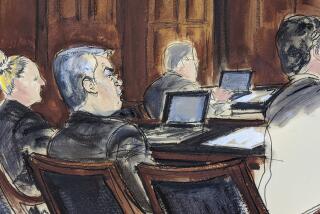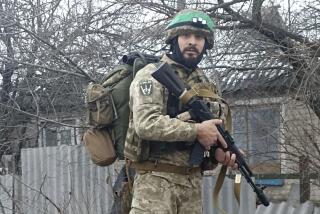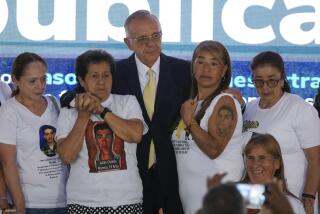Colombia hands ex-paramilitary leader over to U.S.
BOGOTA, COLOMBIA — One of Colombia’s most feared paramilitary leaders was extradited to the United States on Thursday despite protests from human rights groups concerned that details of atrocities and government collusion with militias may never be revealed.
U.S. Drug Enforcement Administration officials escorted Hebert Veloza Garcia, better known as “HH,” onto a plane headed for New York, where he will face drug-trafficking charges.
Half a dozen Colombian human rights groups wrote a letter last month to U.S. Atty. Gen. Eric H. Holder Jr. asking that he delay the transfer of Veloza until after judicial proceedings here that focus on alleged paramilitary atrocities.
Similar protests were heard in May, when Colombian President Alvaro Uribe gave the green light to extraditions of 14 top paramilitary leaders wanted in the United States on drug and terrorism charges.
Veloza was a close associate of paramilitary leaders Carlos Castano and Salvatore Mancuso. Unlike 31,000 paramilitary fighters who had surrendered by 2006 in response to government promises of leniency, education and financial aid, Veloza remained at large until he was captured in 2007.
Seeking to avoid extradition, he became a highly cooperative witness before special tribunals set up to investigate paramilitary crimes. Paramilitary units were formed in the 1980s by cattlemen and farmers to defend against leftist guerrillas. However, they later branched out into drug trafficking and organized crime.
During dozens of appearances at the tribunals, Veloza acknowledged ordering massacres, personally killing more than 100 people, and participating in thousands of other crimes, including extortion and forced displacement of impoverished farmers.
He was boss of the paramilitaries’ Bananeros block, which fought to dislodge leftist guerrillas in the Uraba banana zone in northern Colombia. Paramilitaries under his command killed hundreds of suspected sympathizers and forced thousands more from their homes.
Veloza, 41, also testified that paramilitary units he led received help from Colombian army Gen. Rito Alejo del Rio. Del Rio commanded the 17th Brigade, which human rights groups say was responsible for dozens of extrajudicial killings of civilians. The officer is being investigated for possible collusion with militias.
U.S. Ambassador William Brownfield has said that American authorities will make extradited paramilitary leaders available to Colombian investigators. But Human Rights Watch researcher Maria McFarland said that so far most of them have been too preoccupied with their U.S. cases to cooperate.
Uribe postponed Veloza’s original extradition date by six months so he could have more time to confess his misdeeds. But prosecutors say he got only halfway through the list.
“The details of those crimes, including the collaboration of the military, locations of bodies and reasons for the violence, remain in darkness,” said John Lindsay-Poland, director of the Fellowship of Reconciliation, a New York-based peace activist group.
--
More to Read
Sign up for Essential California
The most important California stories and recommendations in your inbox every morning.
You may occasionally receive promotional content from the Los Angeles Times.










